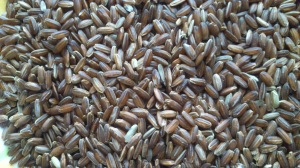A couple of months back I bought a kilo of Njavara rice. I was sorely tempted to buy it when I saw the dark brown unpolished rice. In the hustle and bustle of life, I somehow missed out making rice out of it. Today, being a Friday, a holiday, I did some spring cleaning. Lo, there lay the packet of rice! The menu for lunch was instantly decided. Even while washing it, the colour did not run. That told me the rice was authentic. Cooking it took longer than usual but that was not a dampener. The cooked rice had such a unique taste. Rice with ripe mango pachadi (a traditional wet dish made with ground coconut, cumin seeds, mustard seeds, green chillies and yoghurt), cowpeas dry dish (called Upperii.e. cowpeas cooked with turmeric, chilli powder and salt and garnished with fried onions and fresh coconut scrapings) and some pickle – it was a yummy and delicious lunch.
Njavara Rice, endemic to Kerala
Njavara, with medicinal properties, is an endemic rice variety of Kerala. I am proud that there are eco farms that cultivate this rice in my home district of Palakkad, in Kerala. It belongs to the Oryza genus of grass and is a wild form of the cultivated rice Oryza Sativa commonly known as Asian rice. Njavara rice has a prime place in Ayurveda – both for internal consumption as Kanji (porridge) and external use like in Njavara Kizhi which is part of Panchakarma treatment.
Njavara when consumed internally is said to remove the ills affecting the respiratory, circulatory and digestive systems of the body. It’s cultivation is just like that of paddy. A study at the Regional Agricultural Research Station, Pilicode, described Njavara as a unique cereal having high content of free amino acids. A study conducted at the Agricultural University, Vellanikkara, Thrissur said that “being a rare indigenous genetic resource of high value and unique production and quality characteristics, it is necessary that Njavara is studied thoroughly, conserved, propagated and utilised appropriately.”
Though I have heard about Njavara, I have never known much about it till I explored it today. Worse still, I had never tasted it ever till today! It is time we protected these indigenous treasures from extinction.
